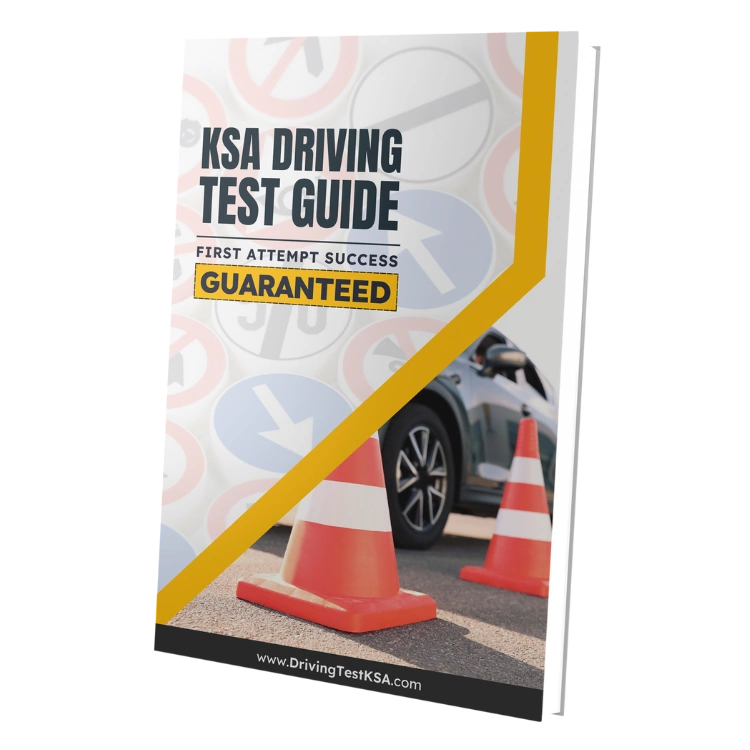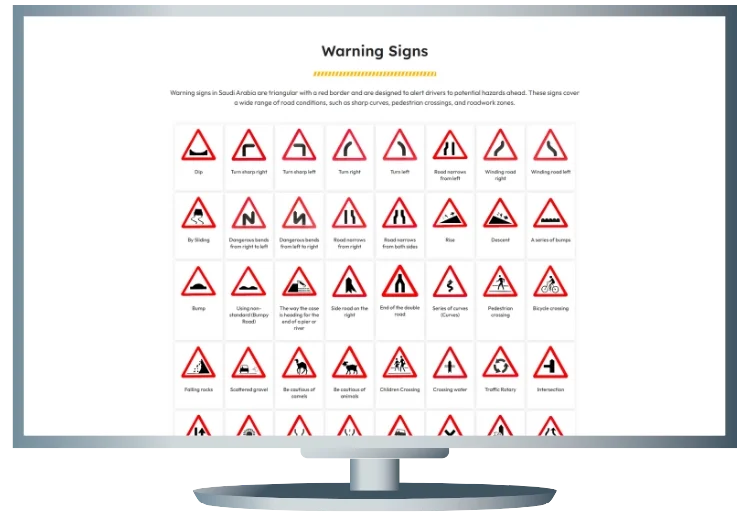

You can switch to any of the 17 available languages for the Saudi driving test practice, including practice exams and materials tailored to match the official test.
Choose your preferred language from the options below:
Start practicing for your Saudi driving test by choosing the test below. Each test includes different road signs or rules to help you prepare. Start with the first test and then go through them one by one. When you feel confident about your preparation, practice with challenge tests.
While practicing quizzes is a great way to prepare, you can also download our Saudi Driving Test Questions Book in PDF format to study offline. This guide includes all the traffic signs, theory questions, and essential road rules, making it easy to prepare even when you don’t have internet access. By downloading the guide, you can continue your preparation and stay on track, wherever you are.

Explore all essential traffic signs and signals in one convenient place. This section is perfect for those who want to quickly review signs without downloading any materials.

Driving vehicles on the roads is strictly prohibited without obtaining a driving license. This ensures that drivers have the necessary skills and knowledge to operate a vehicle safely.
Obtaining your driving license means accepting the responsibility to comply with traffic rules and regulations. It signifies your commitment to safe and lawful driving.
Personal licenses are given to persons whose vehicle weight doesn’t exceed 3.5 tons. This limit ensures that drivers are qualified to handle vehicles of a certain size.
People who come on a visit visa can drive in Saudi Arabia with an International Driving License. This allows temporary visitors to legally operate vehicles.
Obtaining a certificate from a driving school allows you to demonstrate your readiness for a driving license, but you must wait for the traffic administration to check your license before driving on the road.
It is not always mandatory to comply with the speed limit under all circumstances. Drivers should consider road conditions, weather, and surrounding circumstances to ensure safety.
The maximum speed of small vehicles inside towns (urban zone) is 80 km/h. This limit helps maintain safety in areas with higher pedestrian and vehicle traffic.
If there is no plate indicating the speed limit on a road inside towns, the driver should not exceed 80 km/h. This default limit ensures consistency in urban areas.
The maximum speed of trucks inside towns (urban zone) is 50 km/h. This lower limit accounts for the size and braking distance of larger vehicles.
The maximum speed of trucks outside towns (rural zone) is 100 km/h. This allows for efficient travel while maintaining safety on open roads.
The maximum speed of small vehicles outside towns (rural zone) is 120 km/h. This higher limit reflects the reduced traffic and pedestrian presence in rural areas.
The faster the speed, the less control you will have over the vehicle. Higher speeds increase stopping distances and the risk of accidents.
High speed is the main reason for deaths in traffic accidents. Excessive speed reduces reaction time and increases the severity of collisions.
The safe distance between your vehicle and the vehicle in front of you is based on the speed at which you drive. Faster speeds require greater following distances.
The most fatal and common traffic violations in Saudi Arabia are exceeding speed limits and running red traffic signals. These actions significantly increase accident risks.
Exceeding the speed limit by more than 25 kph results in 6 points and a SR 500 fine. This penalty aims to deter dangerous driving behavior.
Driving at a check post with more than 25 kph speed incurs 4 points and a SR 300 fine. This ensures compliance in sensitive or high-security areas.
Traffic police catch drivers for overspeeding through various means, including speed cameras and patrols. These methods help enforce speed limits effectively.
To switch between tracks, the driver should use indicators to let others know. Signaling ensures safe lane changes and communication with other drivers.
The blind area is the part of the road that cannot be seen without moving one’s head. Drivers should check blind spots to avoid collisions when changing lanes.
The existence of two solid lines in the middle of the road means overtaking is not allowed. This rule is in place for safety in areas with limited visibility or high risk.
A white continuous line at your side with a broken line on the other side indicates overtaking is allowed for incoming vehicles in the reverse direction. This guides safe passing maneuvers.
Overtaking is prohibited in heights and bends because the opposite direction is not visible. This restriction prevents accidents in areas with limited sightlines.
When entering a roundabout, the traffic already in the roundabout has priority. Yielding ensures smooth and safe traffic flow.
A driver approaches the intersection of a railway vehicle, overtaking the front car is prohibited when it is far from the intersection by a distance of 30 m. This rule ensures safety near railway crossings.
The driver in the left lane has the priority of overtaking. This convention helps maintain order and safety on multi-lane roads.
Centrifugal force pushes the vehicle away from the curve. Drivers should reduce speed when navigating curves to maintain control.
Highway entrance and exit ramps give drivers the opportunity to adjust their speed according to the traffic. This design facilitates smooth merging and exiting.
When exiting from the highway, it is preferable to reduce speed. Slowing down ensures a safe transition to lower-speed roads.
When entering the highway, it is preferable to increase speed. This allows drivers to match the flow of traffic and merge safely.
Copyright © 2024 – DrivingTestKSA.com